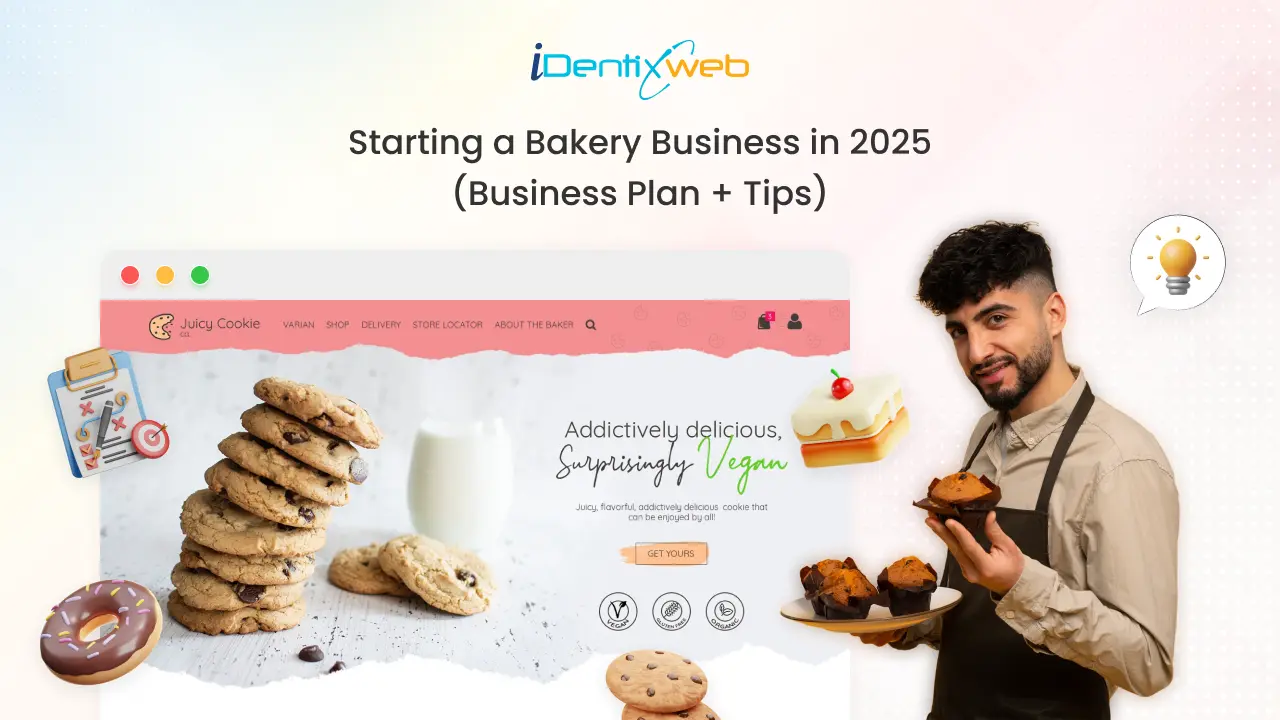
Cakes, cookies, and pastries are a few things in life that bring us complete satisfaction, like baked food items. If you are an entrepreneur at heart and love baked food items, starting a bakery business is your calling.
There are over 32,000 bakeries in the United States. The projected market size will reach $437 billion by 2026.
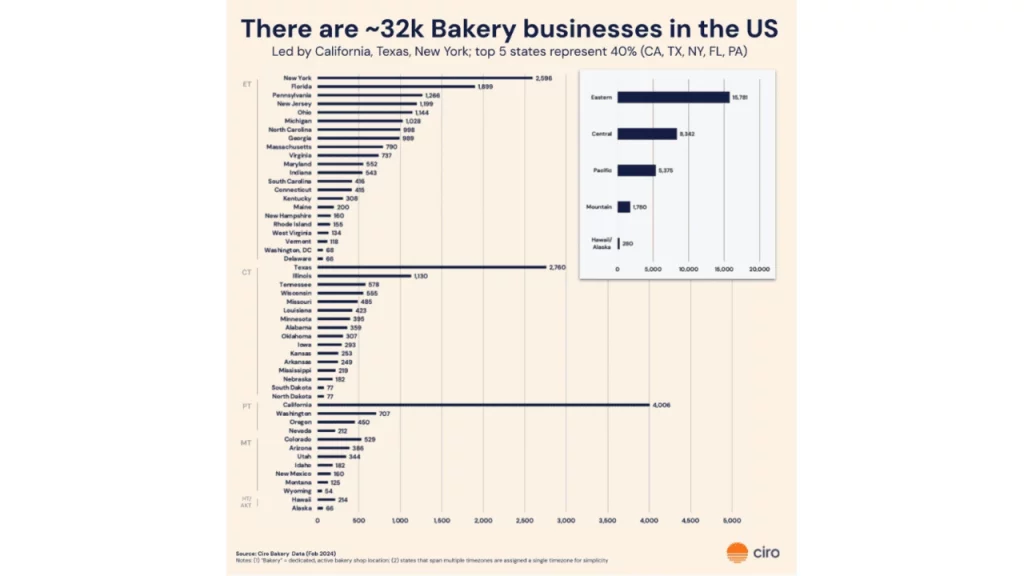
This shows a remarkable growth in the bakery business. Americans love baked goods. Bagels, donuts, muffins, pastries, you name it, Americans love it.
First, let’s start by understanding the benefits of starting a bakery business.
Why Starting a Bakery Business is the Best Idea in 2025?
Rising Consumer Demand:
According to reports, the market for artisan breads, cakes, and pastries is booming. People are more interested in fresh, locally made baked goods than ever before.
Low Start-up Costs
Compared to opening a restaurant, starting a bakery business often has lower start-up costs, especially if you’re working from home. Home bakery business ideas can be very cost-effective.
Community Support
Local bakeries are beloved by communities, offering a personal touch that big chains just can’t replicate.
Profitable & Scalable
There’s a massive list of baked food items that you can sell. With a solid bakery business plan, bakeries can be scalable and profitable.
Let’s understand step-by-step how to open up a bakery business.
How to Set up a Bakery Business? A Step-by-step Guide
Whether you are opening a brick-and-mortar store or starting a bakery business from home, these steps will guide you through turning your bakery business ideas into reality.
Step 1: Create a Bakery Business Plan
A solid bakery business plan is the foundation of your business. It will guide your decisions and help secure funding if needed.
Define Your Niche
Will you focus on artisan breads, pastries, cakes, or a speciality product (e.g., gluten-free, vegan)? Pick a niche you want to sell.
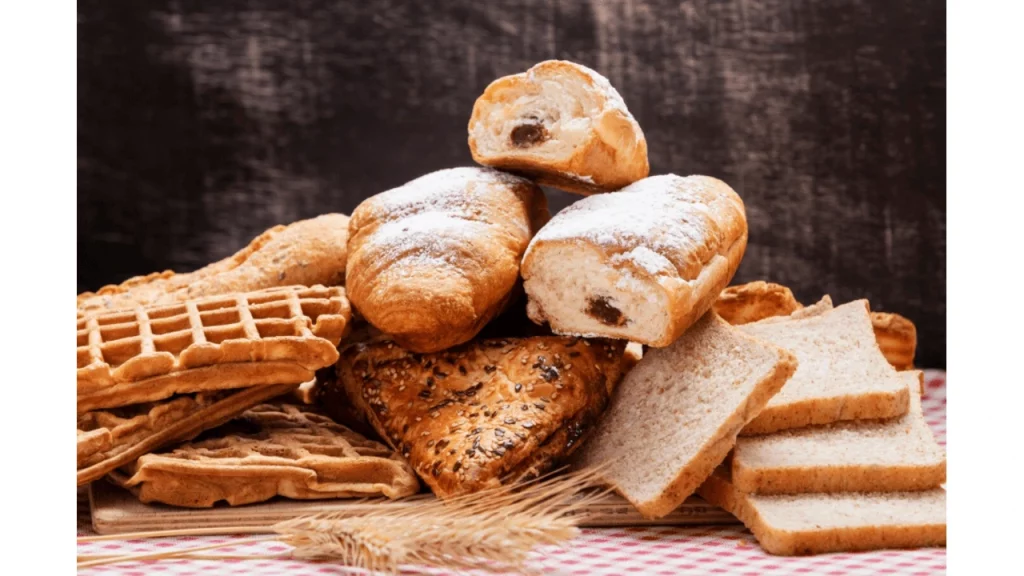
Market Research
Understand your target market, including customer preferences, pricing, and location factors. Location is the most important factor for starting a bakery business. Based on your research, set clear financial goals.
Step 2: Understand the Bakery Start-up Costs
Before you start baking, it’s crucial to know the cost of starting a bakery business. Some common expenses include kitchen equipment like ovens, mixers, cabinets, sheet pans, cooling racks, refrigerators, and ingredients such as flour, sugar, and butter.
Other expenses include rent or lease, if you’re not starting from home and licensing and permits. Check with your local government offices to know the bakery license cost and to obtain the necessary licenses.
Step 3: Licensing and Permits
Before you sell your first baked food item, you need to acquire licensing permits to run a bakery business. Here are the important licensing requirements:
Food handler license: This certification confirms that your bakery business is adequately trained in handling food items.
Sales privilege license: An essential permit that allows you to sell your baked food items.
Zoning permit: If you’re starting a bakery business from home, a zoning permit is required.
Health and safety inspection: Only when you pass this inspection can you operate your bakery.
Step 4: Find a Location
If you're not starting a bakery business from home, choosing the right location is crucial. Keep the following things in mind before deciding on a location.
- Foot traffic: High-traffic areas, like near schools or business districts, can boost sales.
- Rent and lease terms: Ensure that the rental costs fit within your bakery business plan.
- Space for production and customer interaction: Consider the layout and space requirements for baking, storage, and customer service.
Step 5: Hire Staff (if needed)
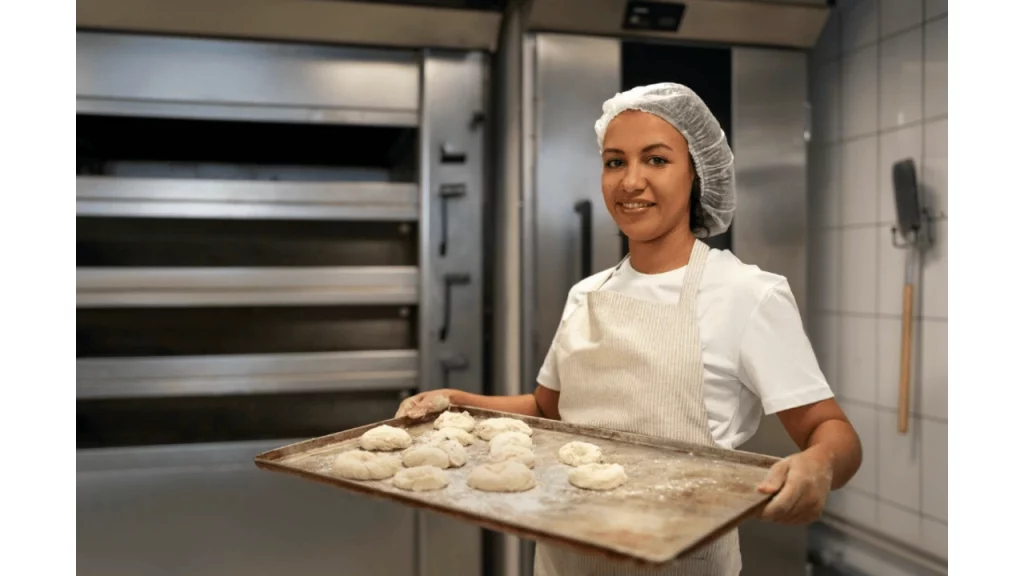
If you're running a medium-sized bakery, you’ll need to hire employees such as bakers who are skilled in producing your core bakery items and front-of-house staff like cashiers and customer service representatives.
Step 6: Set Up Your Bakery

Once you've secured your location, permits, and hiring if required, it’s time to set up your bakery:
- Install equipment: Set up your ovens, mixers, refrigerators, and display cases.
- Design the Layout: Ensure there's enough space for production and a welcoming environment for customers.
- Create a menu: Define the baked goods you’ll offer, taking into account local preferences and trends.
Starting a bakery business is half the battle. Implement the following strategies to run a profitable bakery business.
How to Run a Bakery Business? Best Practices for Success
Whether you're managing a home bakery business or a larger storefront operation, following these best practices can help ensure smooth daily operations and sustained success.
Morning Preparations (Baking)
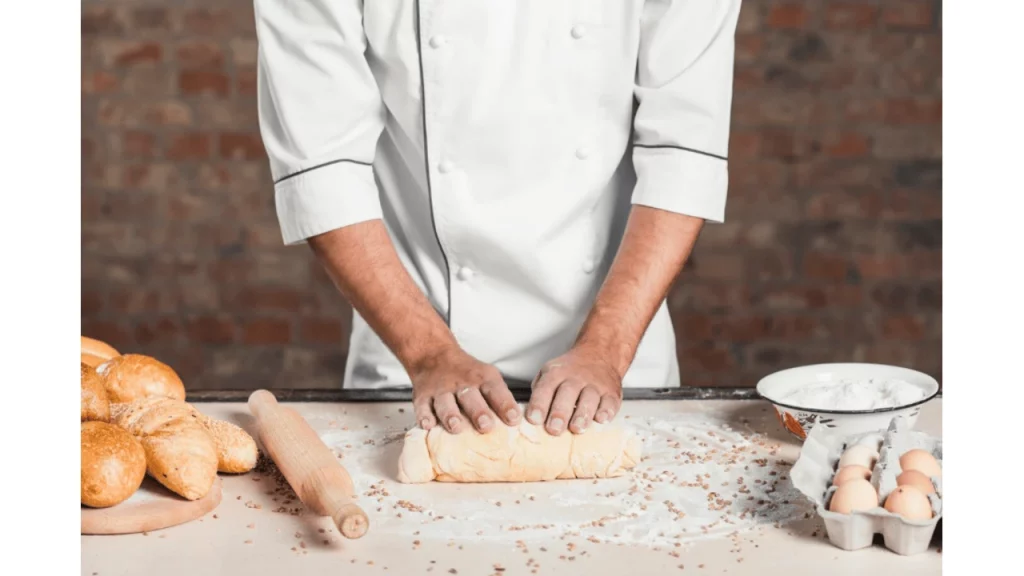
Start early, as fresh goods need to be ready before customers begin arriving. The production process typically starts with mixing doughs, preparing fillings, and baking bread, cakes, or pastries. Some bakeries also prepare items overnight to save time in the morning.
Inventory Management
Every day, you'll need to check stock levels, order ingredients, and manage supplies. Keeping track of your bakery start-up costs and ingredients ensures you avoid overstocking or running out of essentials.
Quality Control
During baking, ensure that the products maintain a consistent quality. This includes checking the appearance, texture, and taste of baked goods.
Customer Service
Running a bakery business also means engaging with customers. Whether it’s taking orders, helping customers choose from your menu, or answering questions about your products (like whether you offer gluten-free options), great customer service will set your bakery apart from the competition.
Packaging and Delivery
If you offer delivery services or catering, organizing and packaging your baked goods neatly is a critical step. Offer clear labeling for orders and ensure timely delivery.
In order to increase sales, you need to be creative with your marketing strategy. Here are some tips to market your bakery business.
How to Promote Your Bakery Business? Best Tips
To attract customers and retain them, strong marketing strategies are essential. Here are some tips for promoting your bakery and building a loyal customer base:
Social Media Presence
Utilize platforms like Instagram, Facebook, and Pinterest to showcase your bakery's products. Post high-quality images of your baked goods, behind-the-scenes glimpses of production, or customer reviews.
Social media helps you connect with a wide audience, engage with local communities, and offer promotions.
Create an Attractive Website
Having a professional website helps build credibility and provides essential information, like your bakery's menu, hours, and location. For a home bakery business, an online ordering system can allow customers to place orders in advance.
Shopify provides an easy-to-use platform to create a stunning, fully functional online store.
With Shopify, you can select customizable themes designed specifically for bakeries, ensuring your website looks great and is mobile-friendly. This allows customers to browse your menu, check your bakery hours, and find your location effortlessly.
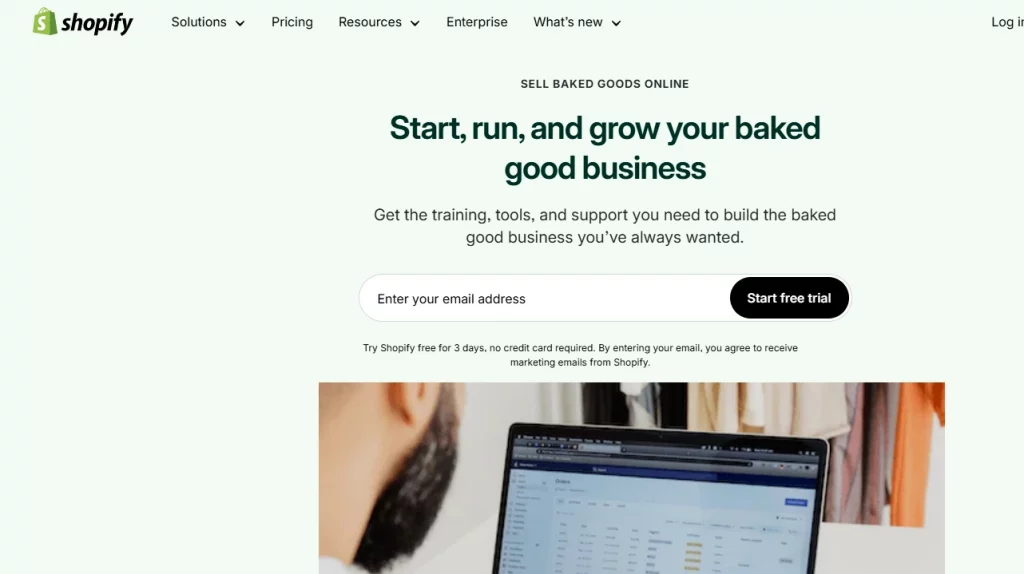
For home bakery businesses or those offering local delivery, Stellar Delivery Date & Pickup is an excellent Shopify app to enhance customer experience.
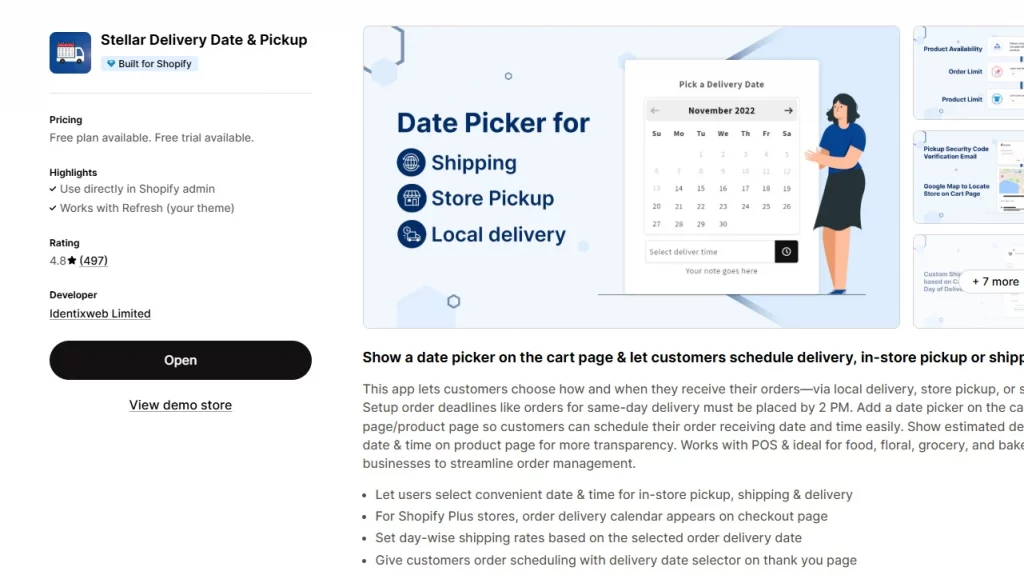
Stellar allows customers to choose delivery or pickup dates and times, giving them flexibility and freedom.
Customers will be able to view estimated delivery dates and times on your product page, providing them with greater transparency and trust in your service.
Collaborate with Local Businesses
Partner with local cafes, markets, or event planners to offer your baked goods. Cross-promoting with nearby businesses can significantly increase visibility for your bakery.
Google My Business
Ensure that your bakery is listed on Google My Business so that people searching for bakeries near them can find you. This helps with local SEO and increases your chances of being discovered by potential customers.
Online Reviews and Testimonials
Encourage satisfied customers to leave positive reviews on Google, Yelp, or your website. Positive reviews build trust and can attract new customers.
Loyalty Programs
Consider introducing a loyalty program where customers earn points for every baked item they buy, which they can redeem for discounts or free items.
Starbucks' loyalty and rewards programs are the best I have seen. Research and learn how they run their program to implement it in your bakery. This will not only encourage repeat business but also enhance customer satisfaction.
Food entrepreneurs are starting bakery businesses from home. Here are some great bakery business ideas to start from home in 2025.
Home Bakery Business Ideas: Niche Markets to Explore
Starting a bakery business from home offers the flexibility to cater to various niche markets.
Vegan Bakery
Create plant-based treats like cakes, cookies, and breads, appealing to vegan and health-conscious customers.
Gluten-Free Bakery
Focus on gluten-free products to serve those with dietary restrictions, offering delicious, safe options for all.
Custom Cakes for Special Occasions
Specialize in personalized cakes for birthdays, weddings, and other celebrations, adding a personal touch to your home bakery business.
Why Launch a Bakery Business with Shopify?
As a Shopify expert, I have encountered a variety of food entrepreneurs from the United States, and I can positively say Shopify has helped bakery owners to scale their business.
With its easy-to-use setup, secure payments, and powerful marketing tools, Shopify lets you focus on baking delicious goods while it handles the tech. Whether you’re starting from home or scaling to a storefront, it’s the perfect recipe for success.
Easy Setup & Management: No coding needed. Quickly set up your online bakery store and start selling.
Secure Payments: Accept multiple payment methods, giving customers a smooth checkout experience.
Built-in Marketing Tools: Promote your bakery through email, social media, and SEO-friendly features.
Order & Inventory Control: Manage stock, track orders, and handle deliveries in one dashboard.
Scalable for Growth: Start small and expand to multiple locations or nationwide shipping with ease.
Partnering with the right Shopify development agency turns your bakery into a thriving online business.
Starting a Bakery Business FAQs
1. What licenses are needed to start a bakery business?
If you are starting a bakery business, you'll need a business license, health department permits, and a food establishment permit. If you're running a home bakery, you will need a home bakery license and a sales tax permit.
2. How to start a bakery business from home?
Starting a home bakery involves setting up a safe and functional kitchen, obtaining necessary licenses, and ensuring compliance with local food safety regulations. You can begin by offering products to your local community.
3. What are the bakery start-up costs?
Bakery start-up costs can vary, but typical expenses include kitchen equipment, ingredients, permits, and packaging. On average, you may need anywhere from $5,000 to $50,000, depending on the scale of your bakery.
4. How to expand your bakery business?
To expand your bakery, consider increasing your product offerings, targeting new customer segments, or opening additional locations. Expanding online through e-commerce platforms or partnering with local cafes can also help grow your reach.
5. Which is the most profitable item in a bakery?
The most profitable bakery items are often those that have a high markup and low production costs, such as custom cakes, pastries, or artisanal breads.


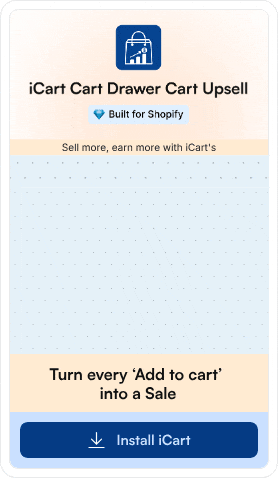
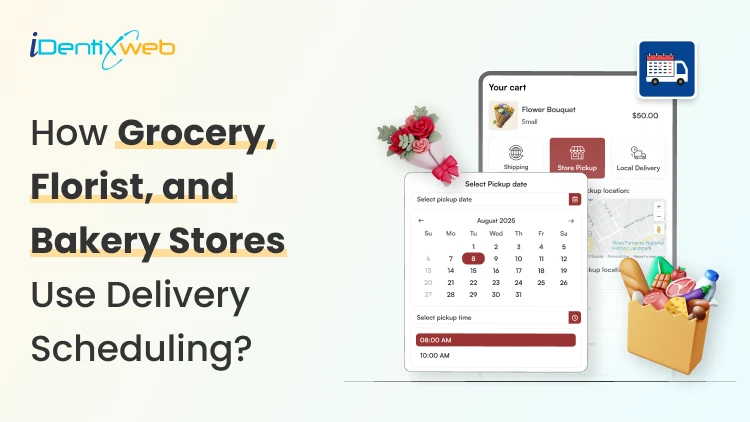
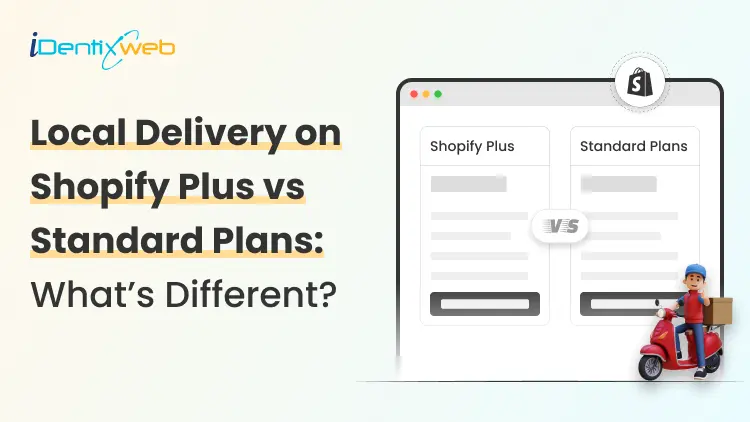
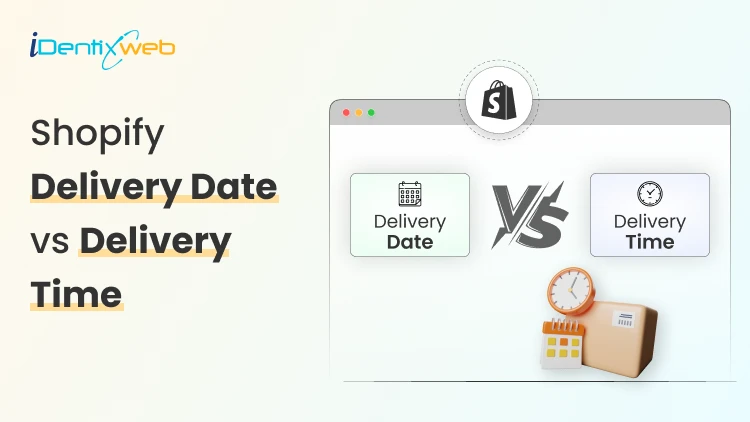

About the author
Vineet Nair
Vineet is an experienced content strategist with expertise in the ecommerce domain and a keen interest in Shopify. He aims to help Shopify merchants thrive in this competitive environment with technical solutions and thoughtfully structured content.